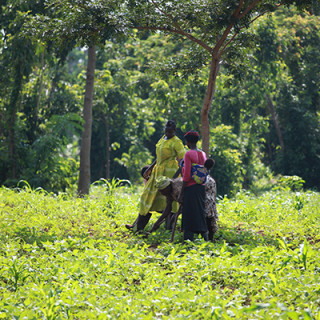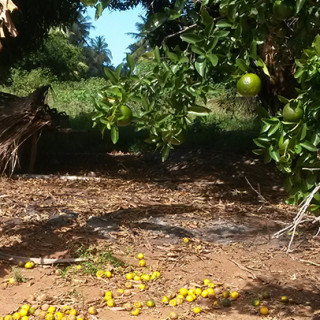Hunting the apes
Africa’s great apes, apes and monkeys thrive in forests with plenty of fruit-bearing trees. They eat of the fruit and subsequently spread the trees’ seeds. People, on the other hand, hunt apes and other wild animals for food, and have done so for over 40 000 years. When only small groups of people subsist on game meat, the balance of nature is upheld. But when hunting increases, this can have unexpected consequences for Africa’s forests, demonstrates Ola Olsson and his colleagues from Lund University.
Hunting has historically been a natural and necessary part of the struggle for survival. When hunting is conducted in an unsustainable way, however, this can lead to local or total extinction of animal species. Entire groups of fruit-eating animals have already disappeared because of hunting in areas of Africa, South America and Asia.
“Local extinction can also lead to problems if the hunted species, such as the fruit-eating apes in Africa, are vital to the ecosystem they live in”, says Ola Olsson, researcher in biodiversity.
Ola Olsson and his colleagues have been investigating the ecological effects of the apes disappearing from the forest by studying the composition of mammals and birds, as well as tree seedlings, in a rainforest area in southeast Nigeria. There, they chose three areas of investigation that included several species, such as mandrills, chimpanzees and gorillas. These sites were compared with three areas with a similar composition of mature trees, but where the apes had disappeared due to hunting.
”These rainforests will change considerably if apes disappear.”
The researchers found that the animal life had changed in the forests where apes were no longer present. The presence of some mammals, such as large rodents, had increased. Above all, however, the vegetation had changed dramatically in these forests, most evident in the tree species that had multiplied, that is, had emerging tree seedlings. In forests with hunting, fewer tree and plant species had their seeds spread by apes, and more were spread by the wind.
“Our results predict that these rain forests, even those protected from deforestation, will change quite considerably if apes disappear”, says Ola Olsson. Ultimately, the changes would also make it impossible to re-introduce apes to areas where they have been eradicated, since there would no longer be enough food for them!
As part of the project, the researchers also visited villages in and around the selected forest areas to ask the people what hunting and the forest mean to them. It turns out that game meat is the most common type of meat eaten in the villages. The villagers mainly eat large rodents such as porcupines and cane rats, but even apes, including chimpanzees and gorillas. They mainly hunt for their own private consumption or buy meat directly from village hunters.
“The fact that hunting in some of the forests we visited has become unsustainable seems to be mainly the result of population growth and declining forest areas”, says Ola Olsson.
Text: Pia Romare
Facts
-
Without apes no fruit
-
Ola Olsson’s study also shows that the villagers gather a lot of fruits and nuts in the woods. These resources are estimated to have a greater economic value than meat. Without apes in the forests these resources are also at risk of reducing or disappearing in the long term.
-
Why is hunting increasing in Africa?
-
The hunt for game meat in Africa has increased in recent decades. The increase is not only due to the fact that a growing population has created a greater demand for meat and reduced the extent of forest areas, but also because of improvements in infrastructure. New roads that are built in connection with deforestation create both a greater amount of available game and improved transportation of game meat to the cities. Game meat, which is an important source of protein for many poor people in Africa, has now also found a global market, and hunting in Africa is largely conducted by non-local commercial hunters. Meanwhile, many people in rural areas depend on hunting wildlife as a buffer to cope in difficult times, or to obtain additional income for special needs.





